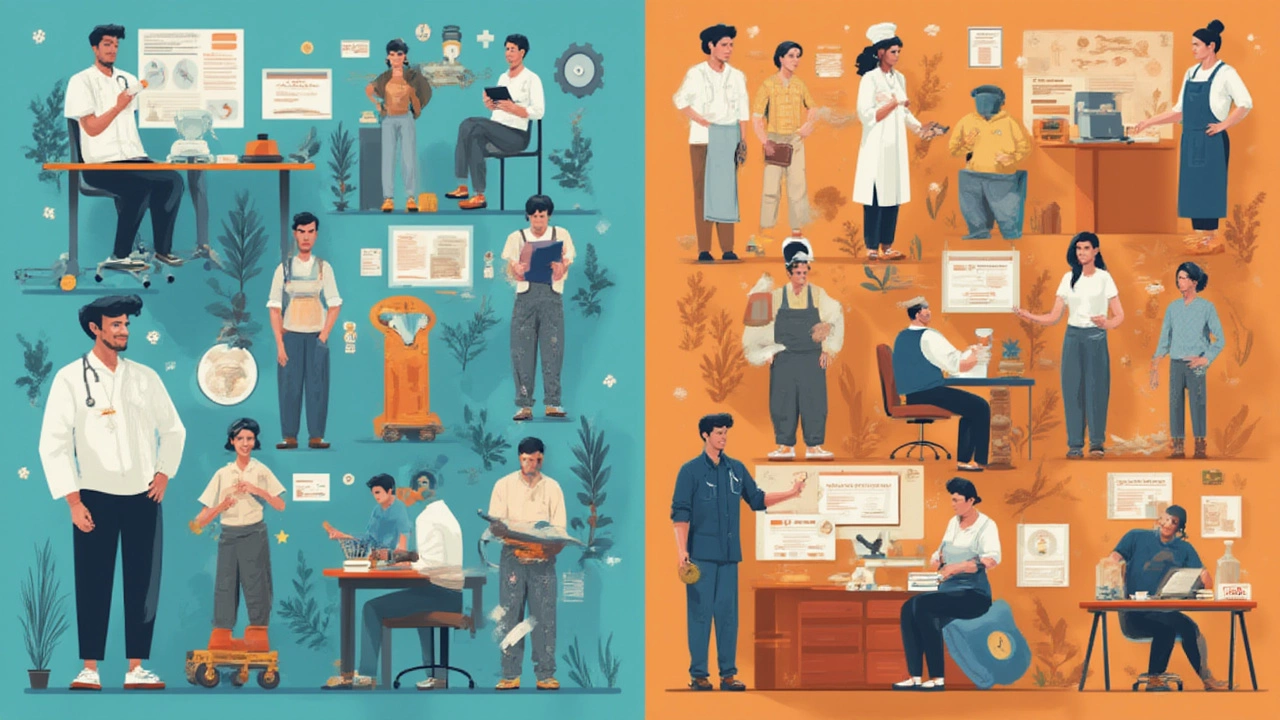If you ask people on the street right now about the difference between ‘vocational’ and ‘educational,’ you’ll probably get a bunch of guesses—and a few blank looks. Yet, this single difference can literally shape your life and job prospects. In 2025, more folks are ditching college lectures for hands-on training, while others still swear by the good old classroom. So, what actually makes these two paths so different? And more importantly, which one speaks to your future?
The Basics: What Do ‘Vocational’ and ‘Educational’ Actually Mean?
Start at the beginning: the word ‘vocational’ comes from ‘vocation,’ basically meaning a job or a calling. Vocational education is about teaching you how to do a specific job—think electricians, chefs, mechanics. It’s straight to the point, hands-on, no time wasted on stuff you’re never going to use at work. Most vocational programs last anywhere from a few months to two or three years and end with a certificate or diploma rather than a degree.
On the flip side, ‘educational’ usually refers to broader, academic learning. This means schools, colleges, and universities where you study subjects like math, history, science, languages, or literature. Educational programs last longer—sometimes four years or more—and end with an academic degree. Here, the focus is on knowledge, thinking, theory, and general skills that you can use across different fields.
The difference sounds clear-cut, but there’s overlap. Some university degrees—like nursing or computer science—also train you for specific jobs. And plenty of vocational programs now include basic academic subjects (like communication or math) to help you get by in everyday work life. But generally, it’s skills and training versus knowledge and theory.
To sum up, vocational is ‘learn by doing,’ educational is ‘learn by thinking.’ Just about everyone on the planet needs both at some point, but how much you lean on one or the other can change everything about your job prospects, your pay, and even how you see the world.
How the Pathways Shape Your Job and Career Prospects
Here’s where things get real. If you pick a vocational route, you’re usually signing up for shorter studies and a quick jump into the job market. Plumbers, welders, dental hygienists—most start earning cash within two years of starting their training. And get this: According to the U.S. Bureau of Labor Statistics, more than half of all new jobs in the next decade will require either a vocational diploma or certificate—not a traditional college degree.
Now, check out who’s usually holding the top spots in companies—managers, policy planners, researchers. These roles typically need an academic background. Getting there involves years of university or advanced study, sometimes grad school. But the payoff? Higher average salaries, leadership opportunities, and jobs that change every few years.
So, which is better for the future: vocational or educational? If you love working with your hands and want stability fast, vocational wins. If you want flexibility and don’t mind paying your dues up front, education takes the cake. In fact, countries like Germany and Switzerland have famously strong vocational systems—they crank out some of the world’s best craftspeople and engineers, and those jobs are often just as respected as academic roles.
But be careful: tech is changing the game. Automation could make some traditional trades (like auto repair) less relevant, while opening up demand for new ones, like robotics. Academic degrees aren’t bulletproof either—take a look at the rise of AI or online learning, and how they’re turning the need for general knowledge upside down. Every path has risks, but understanding which pathway matches your strengths and the job market is the winning formula.

The Learning Experience: How Do Vocational and Educational Approaches Really Feel?
Let’s talk about what you get if you sit through a vocational course versus a university lecture. Vocational learning is like rolling up your sleeves for most of your classes. Say you’re learning car mechanics—you’ll spend more time under the hood than reading about engines in a book. Classroom time is swapped for workshops, jobsite labs, apprenticeships, and real-world scenarios. Tests? You’ll probably be fixing something that actually matters rather than filling in boxes on a quiz.
Academic learning, meanwhile, puts you at a desk (or behind a laptop), with lectures, research papers, maybe some group projects. Here, the focus is mental muscle: logic, problem-solving, analyzing stuff deeply. You often get graded by exams, essays, or presentations. The projects might not seem useful right away, but they’re big on ideas.
This isn’t just people’s opinions—actual brain studies back it up. Research from the University of Cambridge found hands-on skills boost memory and confidence, while academic study sharpens critical thinking. Want the world’s best train conductor? Go vocational. Trying for a Nobel Prize? That’s probably academic territory. The best path depends on what kind of learner you are and where you want to end up.
And here’s an insider tip: Many students combine the two! You might start with a vocational course, get a job, then come back and finish a degree later. Others earn a degree and then do a short diploma just to upgrade their job options. In 2025, education doesn’t have to be one-size-fits-all any more.
Surprising Myths and Facts about Vocational and Educational Routes
Okay, let’s bust some myths. First, the old line “vocational is only for those who aren’t good at school” is pure nonsense. Some of the highest-paying jobs in the world require vocational chops. Take a look at what elevator installers or radiation therapists earn—the median pay in 2023 was above $60,000 USD a year, and that’s without a college degree.
Myth two: “A college degree guarantees a great job.” Not so fast. In the USA, more than 40% of recent grads in 2024 ended up in roles that don’t require a degree (think sales, customer service, hospitality). Many are saddled with student debt, too. The real edge comes from knowing what employers need, and sometimes that’s a trade skill more than a diploma.
Fact alert: Countries with strong vocational education often have lower youth unemployment. Germany is the classic example—it boasts a ‘dual system’ where students split time between the classroom and a real workplace. In 2024, its youth unemployment hovered below 6%, compared to 13% in the US. Why? Because students are job-ready the day they finish school.
Now, some folks think vocational means you can’t move up the ladder. Again—wrong. Plenty of top business leaders started as apprentices. In the UK, about 25% of company directors in large trades firms never set foot in a university. It’s not where you start, but how you grow your skills that matters.

How to Choose: Tips for Picking the Right Path for You
The real question is, how do you figure out the right mix for your life? There’s no magic answer, but a few smart tricks help you figure it out fast:
- vocational paths work best when you love a specific skill and want to get your hands dirty.
- If you’re not sure about one career, or need options, academic learning offers flexibility to change direction.
- Check local job markets—sometimes vocational jobs are in crazy high demand and pay more than office jobs.
- Try job shadowing or internships first. Spend a day in a workplace and see if it fits your style.
- Don’t ignore money talk: Figure out what each path will cost, how soon you’ll be working, and what you’ll likely earn in year one.
- Talk to real people working in both fields. Their stories mean more than glossy college brochures.
- Remember, switching paths later is always possible. Stack your learning (a diploma now, a degree later, if needed).
- Look for hybrid programs—many schools now offer courses that mix hands-on and academic learning.
If you’re curious about numbers, here’s a look at average salaries and employment rates for a few common roles:
| Career Path | Typical Training Needed | Median Pay (US, 2024) | Employment Growth (2024-2029) |
|---|---|---|---|
| Electrician | Vocational Diploma | $60,240 | 7% |
| Registered Nurse | Associate Degree (Educational + Vocational) | $77,600 | 6% |
| Software Developer | Bachelor’s Degree (Educational) | $124,200 | 24% |
| Plumber | Vocational Diploma | $61,920 | 5% |
| Teacher | Bachelor’s Degree (Educational) | $62,750 | 4% |
One quick look shows: both routes can land you steady, well-paying work. The trick is knowing which one fits your skills, your dreams, and the market out there right now.
